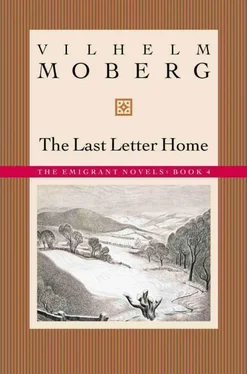But as Karl Oskar approached his claim he looked over his land and the fields his hands had wrested from the wilderness and this acted as a serious reminder: here lay his earth waiting for the seed. Regardless of what happened his fields must be planted. This must not be put aside for anything; if a crop were to be harvested in the fall, seeds must be put in the earth in the spring. This rule of nature must not be altered even by a war. Therefore he must wait for a while yet. He was simply forced to wait. Sowing came first. People must have food next year also. Old Abe, born in a tiller’s cabin, wouldn’t he understand this?
— 2—
Minnesota, the youngest state of the Union, was the first to reply to the President’s call: on the very day it arrived the Republican governor, Alexander Ramsey, offered in a telegram to Lincoln the first regiment of volunteers. And the Minnesota settlers were proud that their state was first. They were seized by an immeasurable anger and bitterness over the insult to the flag at Fort Sumter and several thousand of them were at once ready to sacrifice their lives in battle. Volunteers streamed in in much greater numbers than anyone had counted on. One regiment after another was trained and equipped at Fort Snelling and readied for the war.
Old Abe had asked for 75,000 men. He received in reply a song from the mouths of all the people in the North:
We are coming, Father Abraham,
Six hundred thousand strong. .
In Hemlandet Kristina read about this great joy over the war which had seized people’s minds, and she was profoundly perplexed. She had thought that if people needn’t go to war except of their own free will there wouldn’t be any wars. But her thoughts and feelings had been entirely wrong. Up here in the North no one was forced to go; nothing happened to those who stayed home. Yet they took off, people rushed to the battlefields of their own free will. Of their own free will they went out to kill and be killed. Not only that, they were happy and joyous and exhilarated to be able to kill and be killed. They couldn’t get away fast enough, these volunteers who in their eagerness stepped on each other’s heels at the recruiting places; people were jubilant because they would have an opportunity to kill their neighbors.
The Lord’s commandment was: You shall love your neighbor as you love yourself! But it seemed they hated those neighbors in the South since they were in such a hurry to kill them. This desire of man to kill his own kind must be a curse of the original sin, which would cling to him to the end of time. War was punishment, war was caused by the original sin.
It said in Hemlandet that God took part and fought in the Civil War; fortunately he had decided to be on the side of the North. Eight hundred rebels had for two whole days bombarded Fort Sumter which was defended by one hundred men, but not a single one of the defenders had been killed. Thousands of shots had been fired but not a single Union soldier had fallen — this was a miracle that had taken place in the fort. And this miracle proved that God fought on the side of the Union troops.
How could they print such rot! wondered Kristina. God must have created the Southerners as well as the Northerners and he couldn’t be on either side in the war, for he couldn’t fight against his own creation, his own handiwork. He could only be against the war itself.
Karl Oskar felt the Union must be kept intact whatever the cost. But she replied that if the people in the South didn’t want to belong to the Union, why not let them go? Weren’t they fighting for the right to govern themselves, the same as the people up here in the North? It was senseless; both sides fought for the same thing! Both sides wanted to rule themselves! Why fight over it?
They could easily have come to an understanding if they had said to each other: We will leave you in peace if you leave us in peace! In that way the people of the South as well as the people of the North would have saved their lives.
It wasn’t that easy, explained Karl Oskar. For only through war could the enslavement of the Negroes be abolished. No, said Kristlna, however deeply she felt for the black ones she could not believe that a mass slaughter of other people was the right way to help them. It could not be God’s will that people killed each other by the thousands to liberate some from slavery. To keep your neighbor as a slave was a grave sin, to kill a neighbor was graver.
They could not agree. But the inhabitants of their new country had begun to shed each other’s blood, and each new issue of the paper told about it. In the settlements they read only of the Civil War, but each paper printed a comforting assurance: The North was many times stronger than the South, therefore the North must win. The North would win the war before the summer was over.
They sowed their seed and the kernels sprouted and came up. They planted the potatoes in the furrows and the potatoes returned in rows of dark green stalks. Even in this war spring the black earth fruited with wheat, corn, rye, oats, and root crops. This year too the earth promised the nourishment that would sustain people’s lives.
Summer came and it remained quiet and peaceful in the settlements round Lake Chisago. The thunder of the Civil War rumbled so far away it could not be heard up in Minnesota. Several regiments had left for the battlefields and more were prepared in great hurry. But the void after the soldiers left was not great enough to interfere with daily life; it went on without interruption, each one attending to his chores, no one disturbed in his daily work.
But the war did not go the way the papers had predicted. Everything happened except what was supposed to happen. The war went very badly for the North. Union troops lost one battle after another and were forced to one withdrawal after another. And Northern soldiers fell in unbelievable numbers, their bodies lay stacked in great piles on the battlefields. It was said they fought valiantly but had poor weapons: a soldier could consider himself lucky if he had been given a gun that was no more dangerous to him than to the enemy. Besides, the Union troops had incompetent generals. But the setbacks were not blamed on them as much as on the competent generals of the South.
And after Fort Sumter no more miracles took place to prove that God was fighting on the side of the North. The rebels had the upper hand from the beginning and kept it. Lincoln named a new general to have full command of the North’s forces, but it didn’t help, since the South hadn’t fired any of theirs.
By the end of the summer, when the Union troops already should have won the war, they suffered a great defeat at Bull Run, Virginia. When the papers announced this severe defeat a shock of fear hit the people of the North: Suppose we lose the war?
It seemed the end of the fight was near, but a different end than the one so surely predicted in the spring.
In April Lincoln had asked for 75,000 men, and 600,000 had volunteered. All had been convinced that this great army would be sufficient to win the war. But the inexperienced volunteers had first to be trained and equipped and it was a long time before they could be used in the field. And then came the defeats — and now more soldiers were needed.
In August President Lincoln issued a new call: He asked for another 300,000 men. If this number had not volunteered before the first of October, conscription would be necessary.
This was alarming.
And one day, in the beginning of September, just after the new call had been issued, Karl Oskar Nilsson read in Hemlandet a summons to the Swedish settlers of Minnesota to form a company of their own:
This country has permitted us to settle here in peace, it has received us foreigners with friendship. We enjoy here the same rights, are protected by the same laws, as the natives. Swedes constitute the greatest numbers of foreigners in Minnesota — it is time for us to fight for our adopted land, for the Union!
Читать дальше












